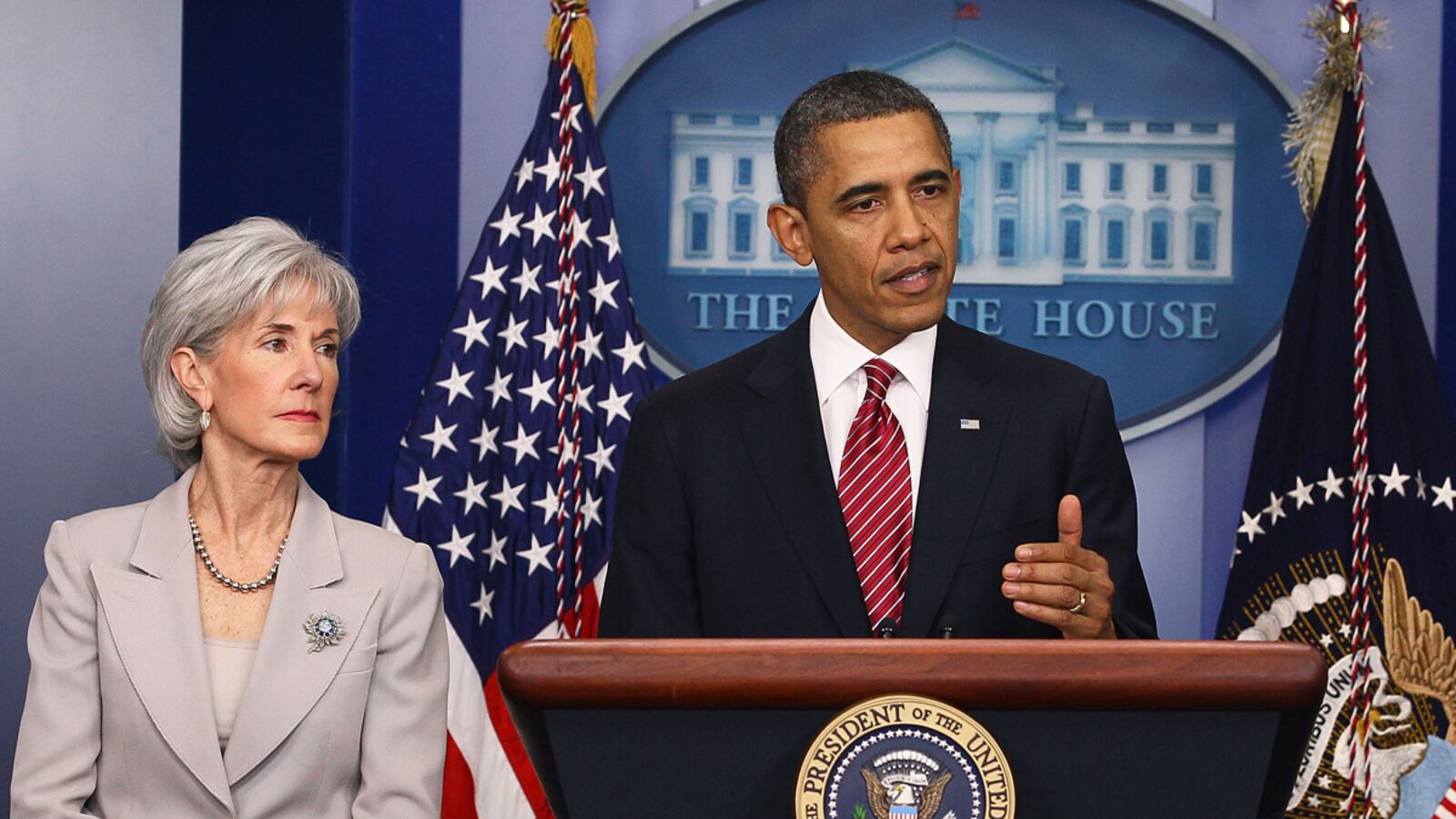Some people won’t take yes for an answer.
On Friday, President Obama attempted to put an end to the roar of disapproval that had been building ever since the administration released a new rule in January requiring religious institutions to provide health insurance to their employees that covers contraception, sterilization, and Plan B. Obama today lifted that requirement.
In response, conservatives blasted the administration.
What was his offense? Obama tossed his original mandate; Catholic institutions will now not be required to purchase health insurance at odds with their religious faith, nor will they be required to alert employees as to where to find them. Instead, when women ask their doctor for contraception, their health-insurance companies will be required to cover it for free.
The National Right to Life Committee called Obama’s announcement a “scam.” Sen. Roy Blunt called it an “accounting gimmick.” Republican Study Committee chairman Jim Jordan called it a “fig leaf” that “still tramples on Americans’ First Amendment right to freedom of religion.”
Dr. David Stevens, the CEO of the Christian Medical Association, told me, “This is, at best, a smokescreen. There is still going to be legislation coming out of Congress [to override this rule] because this is the most fundamental of our constitutional rights, the free exercise of religion. Contraception is a good thing, but nobody should be forced to purchase it. There should be a religious exemption for any American who is opposed to this.”

That’s what you call moving the goalpost.
For the last few weeks, critics have been demanding that religious institutions not have to pay for insurance that covers contraceptive services. Obama heard them and changed the policy. Now the new problem is that “no American” with religious objections should have to purchase it. Sound familiar? Yep, it’s the old anti-Obamacare talking points about government mandates dressed up as a religious-freedom issue.
Discussing the issue on Fox News following the announcement, former Arkansas governor Mike Huckabee echoed this argument: “I am an employer. So my question is, do I now have the right to say, ‘Look, I don’t want to provide something [like Plan B] that I find morally repugnant and morally reprehensible.’”
Answer: if I had to pay for the Iraq War, then no, you don’t have that right. (By the way, the Catholic Church opposed the Iraq War.)
If you accept the argument that the government can’t make an individual pay for policies he or she finds morally repugnant, then that would mean I shouldn’t have to pay taxes if I am living in a state that executes people, since I find the death penalty morally repugnant. (The Catholic Church opposes the death penalty too.)
Conservatives will argue that paying taxes is different from buying an insurance policy, but really it isn’t. The concept is the same. At times, as citizens of this country we are forced to pay for things we don’t like, or even morally oppose, because our duly elected officials make decisions with which we disagree. The onus is on citizens to persuade the government to abandon policies that we find repugnant or to work to get them out of office.
Former Democratic congressman Tim Roemer, the chairman of Democrats for Life, pointed out in an interview that this debate was never about individuals buying health insurance. “This has been about preserving the conscience clause and the great tradition of religious freedom. How do we make sure there is not a mandate if you are a Catholic institution? This is not about someone who owns a Taco Bell and they [oppose birth control].”
While conservatives vowed to fight Obama’s new policy, the high-profile Democratic and left-of-center Catholics who had been loudly protesting the administration’s previous regulation greeted the announcement with a cheer. Sens. Bob Casey and Tim Kaine, as well as columnist E.J. Dionne, welcomed the change. Former congressman Bart Stupak, the pro-life Democrat who led the fight to secure the executive order ensuring that federal funds wouldn’t be used for abortion and protecting the conscience clause, expressed support of the president’s new policy.
The Catholic Health Association said in a statement: “We are pleased and grateful that the religious liberty and conscience protection needs of so many ministries that serve our country were appreciated enough that an early resolution of this issue was accomplished.” The head of that organization, Sister Carol Keenan, was one of many high-profile Catholic supporters of Obama’s Affordable Health Care Act who recently blasted the contraception mandate.
Catholic Charities, which employs 70,000 people, applauded the president’s decision, saying in a statement, “We are deeply appreciative that the administration has recognized the importance of a religious organization’s fidelity to their deeply held beliefs.”
The wild card here is the United States Council of Catholic Bishops, which is studying the new policy. An official there told me, “There will be elaboration, but only when we have had a chance to explore what is there. When the White House stops and says, ‘I’m hearing your concerns, we have to take that seriously.’”
One of the issues the bishops are surely examining is what to do with organizations that use Christian insurance companies. A person who was briefed on the issue told me that the administration is working hard to resolve this issue.
The White House made a serious effort to address real concerns about religious liberty. People of good faith should be satisfied.






